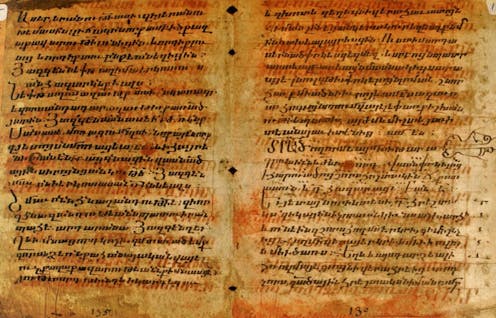
In June of last year, the Guardian revealed that John Hughes’ Miles Franklin-longlisted novel The Dogs contained material lifted from The Unwomanly Face of War, a book by Nobel Prize-winning Belarusian journalist Svetlana Alexievich. When approached about this, Hughes apologised for the transgression, describing the plagiarism as unintentional.
Before long, it was found that The Dogs contained material taken from numerous other texts, including widely read classics The Great Gatsby and All Quiet on the Western Front.
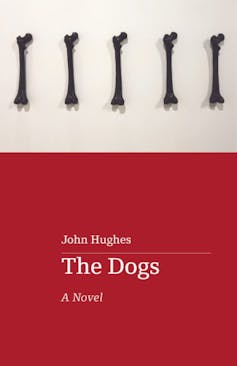
Hughes responded to these further revelations not with an apology, but with a spirited self-defence. He compared himself, rather incongruously, to Jorge Luis Borges’ Pierre Menard – a fictional character who sets out to rewrite Don Quixote line for line (the absurdity of the endeavour being the point) – and Jean Rhys, whose novel Wide Sargasso Sea does not hide the fact that it is a prequel to and reframing of Jane Eyre that exposes the original’s colonialist underpinnings.
Hughes was, he claimed, creating “a kind of literary palimpsest”. He insisted he had “always spoken through the voices of others”.
As time went on, more plagiarism was found. The story has now culminated with an in-depth investigative essay in the Monthly written by Anna Verney, author of the original Guardian article, and Richard Cooke. They have determined that “Hughes may be among the most prolific literary plagiarists in history”.
The practice seems to have escalated over the course of his career. Having analysed The Dogs, Verney and Cooke note that the
“borrowings” run from sentence parts to pages at a time. Our own table comparing the 312-page novel with these books is 170 pages long, and had to be put on hiatus.
Unattributed, concealed
Hughes’ self-defence, tenuous from the start, has become increasingly unconvincing. For one thing, he only identified borrowing-as-method after being accused of plagiarism – previously, his sources remained unattributed, concealed. For another, his claim of intentional collage and appropriation contradicted his initial claim that his incorporation of Alexievich’s work was an unknowing error.
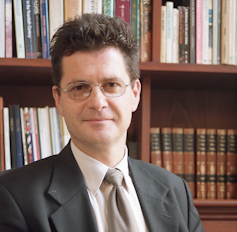
Perhaps more importantly, it is difficult to sustain the literary veneer of borrowing-as-method when Hughes has lifted material from Sparknotes – described by Cooke and Verney as “a set of cribs and summaries intended for high-school English students” – for an essay included in his collection Someone Else, and from the Dementia Australia website for a description of Alzheimer’s disease that appears in his novel No One.
How could Hughes rationalise the plagiarising of one of his own students, Joseph Earp, who responded to the discovery with a measured and nuanced reflection?
Most egregiously, Verney and Cooke have found that No One, a book that attempts to grapple with the trauma inflicted by settler-colonialism, includes material appropriated from the testimonies of Aboriginal Australians in the “Bringing Them Home” report into the Stolen Generations.
What is an author?
A plagiarism scandal is titillating in part because its stakes seem clear, the villain obvious: plagiarists have cheated, ignoring a law by which the rest of us abide. Throughout our schooling, we are taught it’s wrong to copy from the person seated next to us in the exam hall. “Academic dishonesty”, as it is referred to in universities, can be sufficient reason for expulsion. Plagiarism is theft and fakery: stealing another’s labour and deploying it for one’s own advantage and aggrandisement.
Under such circumstances, punishment must be forthcoming. Earp noted the relish with which interested parties on Twitter condemned Hughes’ wrongdoing, some “anticipating that John might have a mental breakdown”.
There are two easily tangled threads here that are worth untangling: the legal and the moral. Legally, we are not permitted to take another’s intellectual property without permission. Part of the fascination with Hughes’ plagiarism, then, depends on the legal authorisation of our adverse moral judgement.
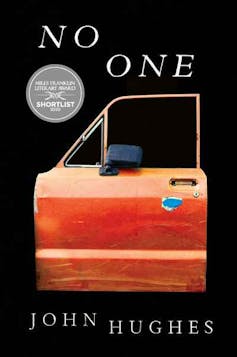
In his essay What is an Author? (1969), Michel Foucault argues that “speeches and books were assigned real authors only when the author became subject to punishment and to the extent that his discourse was considered transgressive.”
Foucault attributes the value we place on authorship to the tradition of “Christian exegesis when it wished to prove the value of a text by ascertaining the holiness of its author”. He goes on to link our contemporary understanding that authors have “ownership” over their work to the establishment of copyright law in the late 18th and early 19th century.
Rather than describing the author as an individual, Foucault instead describes the “author-function”, which, he writes “is not defined by the spontaneous attribution of a text to its creator, but through a series of precise and complex procedures”.
As Foucault suggest, the power we grant authorship depends on these questions, and on our ability to punish an author when that power is abused.
Read more: Plagiarism, John Hughes’ The Dogs and the ethical responsibilities of the novelist
A personal deception
Literary plagiarism can feel like a particularly personal deception, because when we read we are doing so, in part, to connect with the mind of the author. We judge a book with the presumption that the words are the author’s. The plagiarist breaks that contract.
The plagiarist also risks exposing and embarassing the reader who fails to recognise sentences straight out of Anna Karenina or The Great Gatsby as an unliterary fool. The reader has approached the work in good faith, and this good faith has been exploited.
But there is also something tragic about plagiarism, in that it constitutes a forfeiting of the self, an acceptance that influence cannot be surpassed.
Plagiarism is transgression commonly associated with lazy students. But it is worth noting that, as a teacher, I have found students tend to plagiarise not because they are lazy, but because they fear they lack the capacity to stake out their own claims. It is rarely effective as a labour-saving device. “The paradox of plagiarism,” David Foster Wallace wrote, “is that it actually requires a lot of care and hard work to pull off successfully.”
In a 2021 review of the first biography of W.G. Sebald, Ben Lerner notes that Sebald’s
phrases, sentences, even paragraphs are often lifted from or echo other writers; a critical cottage industry has been built around tracking down the sources Sebald integrates so seamlessly into his own melancholic voice. The technique means that even his narrator’s most personal statements are ghostly and choral and anachronistic and often vaguely familiar in their very texture.
Lerner admires Sebald (as do I and many others), but his appropriations are morally fraught and controversial. Lerner concludes his review with an acknowledgement that “writing is a questionable business”.
Sebald died in 2001. Most of his appropriations were discovered posthumously. While his plagiarism has shaped how he is spoken of, it has not proved fatal to his reputation (though I do wonder what questions would be asked if he still lived).
Hughes, in turn, lifts from Sebald. Verney and Cooke speculate that Hughes may have “imagined himself an Australian Sebald”. Sebald’s integration of the words of others into his own voice reflects his concern with history, memory and trauma in post-World War II Germany; Hughes’s work is preoccupied with similar themes, which he considers in an Australian context.
Sebald is unlike Hughes, however, in that he has an established international reputation. Few recent authors have had more influence on the direction of contemporary literature.
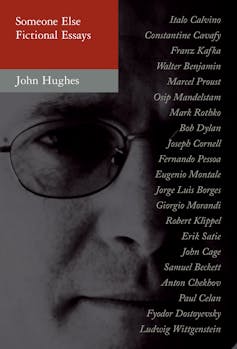
Several of those who spoke to Verney and Cooke (including Hughes’ publisher) imagine how Hughes might continue to write and keep his books in print, but the overwhelming consensus has been that this scandal should signify the end of his literary career. Is it worth considering what forgiveness or redemption might look like, if only to reflect on the qualities that make the Sebald case seem ethically ambiguous and the Hughes case ethically unambiguous.
There are, of course, matters of degree and context when it comes to plagiarism. The first known novel by an African American, Clotel by William Wells Brown, copied more than 87,000 words from nearly 300 sources. In Plagiarama!, Geoffrey Sanborn makes a convincing case that the extent of Brown’s borrowings make the book “read more like a public-oriented series of apparitional events than like the monologic product of a solitary self”.
Clotel’s plagiarism was a manifestation of what Sanborn describes as “an aesthetics of attractions.” But its significance is also tied to Brown’s monumental feat of having escaped enslavement, absorbed so many sources, and published the first African American novel, irrespective of its technique.
Verney and Cooke suggest that Hughes, as a white man, is a more likely candidate for redemption than a woman or person of colour in the same position. The power dynamics matter. Where Brown wielded the tools of his oppressors to his own advantage, Hughes could be said to have repurposed the suffering of Aboriginal Australians as literary ornamentation. There are circumstances that justify an author becoming a conduit for unattributed voices, but it is very hard to justify in this instance.
Foucault might be happy to consign Hughes to the status of author-function, but the question of authorial ownership is not theoretical. The postmodern arguments for pastiche and collage have become less welcome in a world that is increasingly conscious of the political implications of such appropriations and where, increasingly, artists are fighting for scraps.
“Once published,” write Verney and Cooke, “the reality was that Hughes’s plagiarism went undiscovered for so long because so few people were reading his books.” It seems true that the majority of people who have now heard of Hughes did not know of him before this story broke. Writing has never been a particularly great way to get rich. In contemporary Australia, writers are rarely well-compensated. Here, too, Hughes’ actions appear ethically questionable. As Earp observes: “He was compensated for my labour.”
It is not unique to Australian literature that books are often more talked about than read. But in this relatively minor zone of antipodean reading and writing, it is inevitable that a story like this prompts us to ask how it might be symptomatic. Does the appropriation of European Nobel Prize-winners suggest an inferiority complex, an unhealthy worship of the continent? Is the frailty or shallowness of our literary culture to blame? Or is Hughes simply an aberration? A man who so filled himself with others’ writing that no room remained for him?
Verney and Cooke’s essay is thorough and restrained. It does not uncomplicatedly condemn Hughes, but adopts a disposition of curiosity and astonishment. What on earth could lead someone to plagiarise so often and so comprehensively? Multiple sources cited in the Monthly article note that Hughes is a talented writer and an intelligent man. Earp describes him as “astonishingly smart”.
The mystery of his motivation, then, becomes a compelling psychodrama, which perhaps explains why I cannot recall an event associated with Australian literature in recent years that has garnered quite as much coverage or excited talk.
Hughes was right to say, in his self-defence, that all authors are influenced by, and borrow from, other authors without explicit citation. But there is a threshold, blurry as it may be, where influence and allusion become plagiarism, and, knowingly or unknowingly, Hughes blew right past it.
Dan Dixon does not work for, consult, own shares in or receive funding from any company or organisation that would benefit from this article, and has disclosed no relevant affiliations beyond their academic appointment.
This article was originally published on The Conversation. Read the original article.







